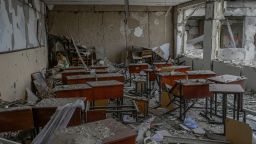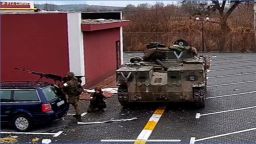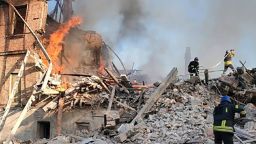When Ukrainian forces regained control of Katyuzhanka, a village north of Kyiv that had been under Russian occupation for more than a month in March, they found the local school wrecked. Any equipment that hadn’t been stolen was smashed, there was a makeshift cemetery in the school yard and deep trenches had been dug across the football pitch.
Inside one of the destroyed classrooms, written in chalk on a big, green blackboard hanging on the wall just below a portrait of Isaac Newton, was a letter addressed to the pupils and signed “the Russians.”
It read: “Children, we’re sorry for such a mess, we tried to save the school, but there was shelling. Live in peace, take care of yourselves and don’t repeat the mistakes your elders made. Ukraine and Russia are one people!!! Peace be with you, brothers and sisters!”
The note, written in Russian, as opposed to Ukrainian – the school’s language of instruction, was one of several left on blackboards and whiteboards scattered around the building. “We are for the peace in the whole world,” another one said. CNN cannot independently verify who wrote the notes.
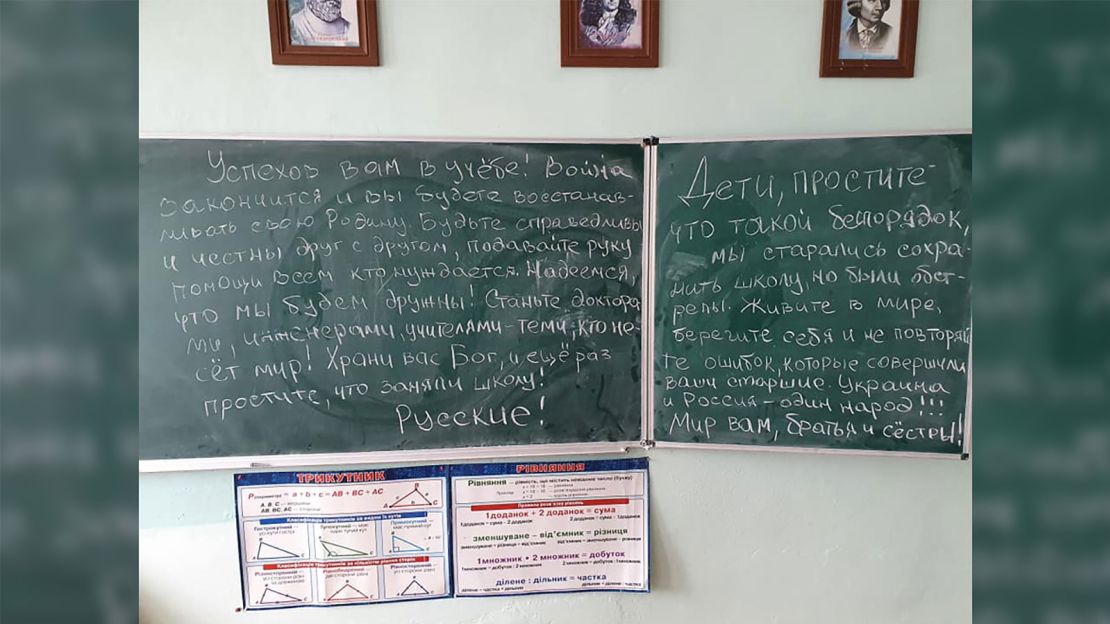
Mikola Mikitchik, the principal of the Secondary School of Katyuzhanka, told CNN last month he felt disgusted when he found the notes.
“They wrote ‘Russians and Ukrainians are brothers’ and at the same time they robbed the school … they ruined computers, they took out hard drives, they took away laptops, printers, they left nothing at the school! It’s barbarism and hypocrisy,” he said.
Mikitchik told CNN three anti-tank mines, several stun grenades and machine gun magazines with bullets were found on the school grounds. The kitchen, recently refurbished with new equipment that was used to feed more than 500 children on a daily basis before the war started, was completely wrecked.
According to an operational update published by the Ukrainian Ministry of Defense on March 3, Russian troops were in control of Katyuzhanka at that time, having established logistics camps there and in other villages in the area.
Katyuzhanka is a small village, but strategically important due to its position on one of the main roads leading to Kyiv. Satellite images from early March revealed a 40-mile-long (64-kilometer-long) Russian military convoy composed of tanks, armored vehicles and towed artillery in this area.
Mikitchik has estimated the material damage caused by the Russian troops – and in his mind there’s no doubt it was them who looted the school – amounted to about 5 million Ukrainian hryvnia ($170,000) and said he cannot imagine pupils coming back any time soon.
‘We hope we will be friends’
“Everything was taken out. Even the cables were stolen. We had electrical cables made of copper wire and 100 meters of the cable were stolen,” he said.
At the same time, another note left in the school said: “Be fair and honest with each other, give a helping hand to everyone who needs it. We hope we will be friends! Become doctors, engineers, teachers – those who bring peace!”
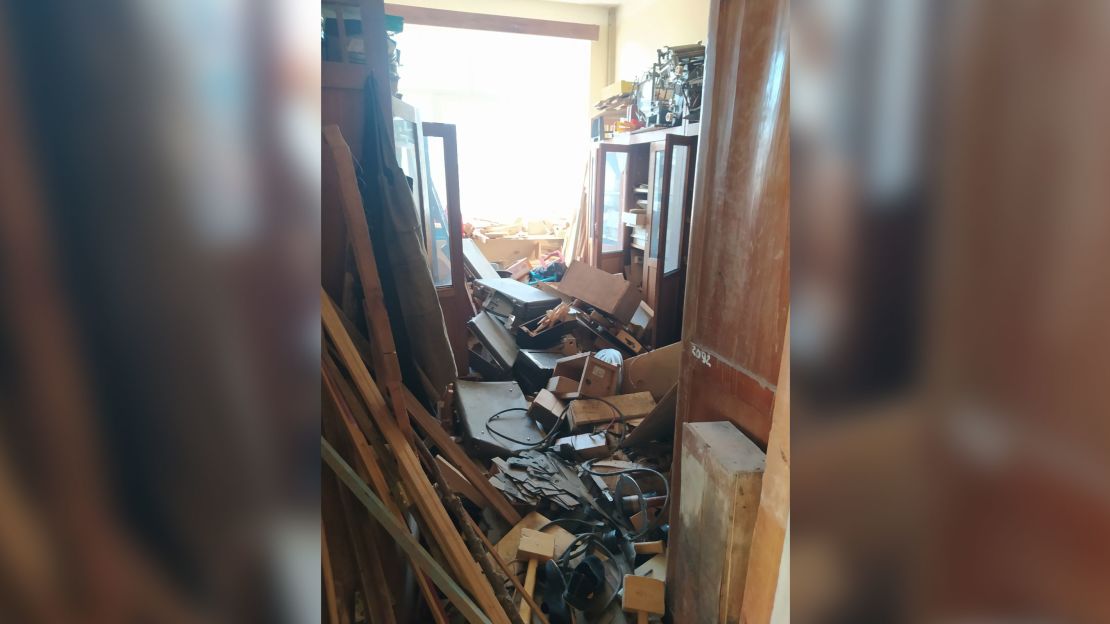
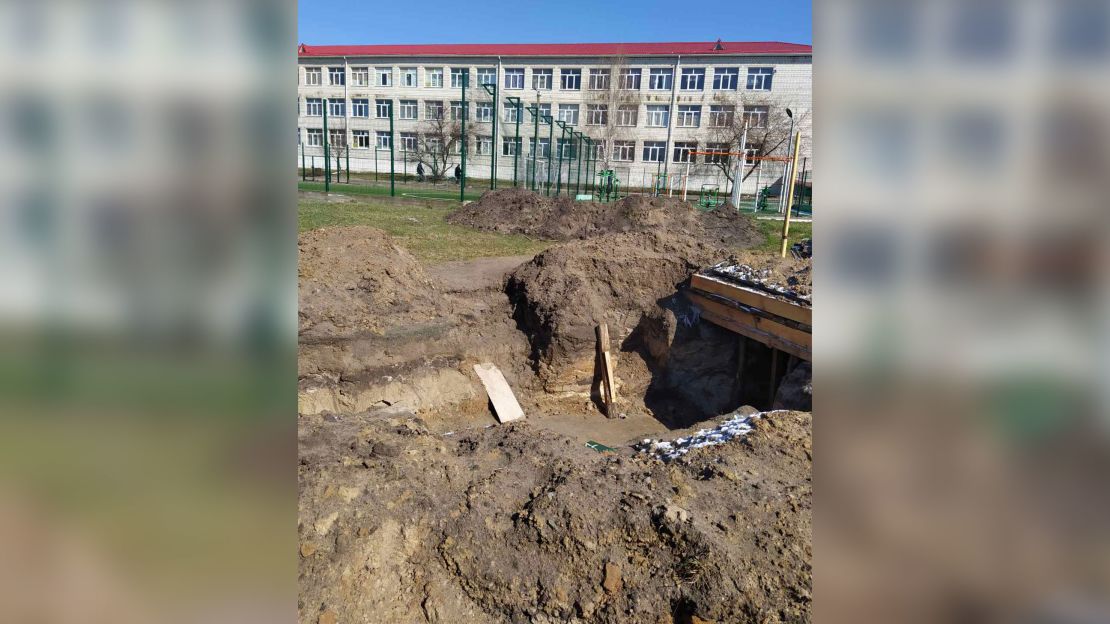
The notes scribbled on the blackboard in Katyuzhanka were among dozens of messages found in schools in previously occupied areas of Ukraine after the withdrawal of Russian troops.
In Ukraine, photos of these notes became a symbol of the cruelty and the enormous toll of Russia’s unprovoked aggression.
But in Russia, they generated a very different response when they first emerged in April and quickly became part of the propaganda portraying Moscow’s assault against Ukraine as a “liberation.”
The Russian news website Lenta.ru ran an article about “touching messages to Ukrainian children” left behind by the Russian military, while the website of the Russian TV channel Tsargrad reported a “sincere” note that wished Ukrainian children “success in their studies.”
Former Russian culture minister Vladimir Medinsky even shared a picture of one of the notes, saying he was “touched” by its message.
‘We’re sorry, we didn’t want this war’
In Novyi Bykiv, a village in the Chernihiv region east of Kyiv, principal Natalia Vovk also found a number of notes written on blackboards, many of them calling for peace and friendship between the Ukrainian and Russian people.
The Novobykivsky General Secondary Education School was hit hard during the fighting. The roof was severely damaged by shelling and all of the windows were broken, Vovk told CNN last month.
“The library is damaged. School textbooks are completely burned, not a single textbook remained. Desks are broken, equipment was taken away, computers were taken out,” she said.
Yet in numerous classrooms, notes calling for peace were left by the Russian troops, she said.
“We’re sorry, we didn’t want this war. Slavic brothers, you’re being deceived. War is bad, don’t fight, children!!” read one sign, written in large letters across a green blackboard.
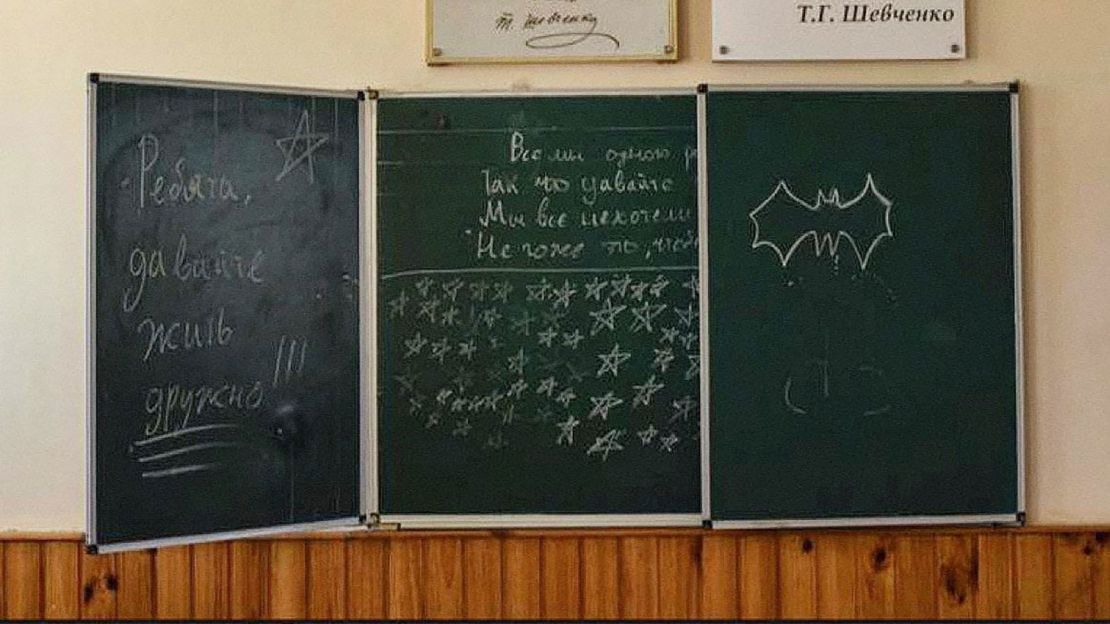
“Let’s live in friendship!!!” was jotted down on another board, Vovk said. A picture from another classroom shows a sign that says, “We are all Slavic. It is not good for brothers to go [against each other] with a knife.”
Like Mikitchik, Vovk is now cataloging the damage done to her school during the occupation.
“We had an interactive panel, that cost us 100,000 hryvnias ($3,700) and they stole it. Printers and laptops were stolen. What they couldn’t steal, they broke, made it unusable,” she said.
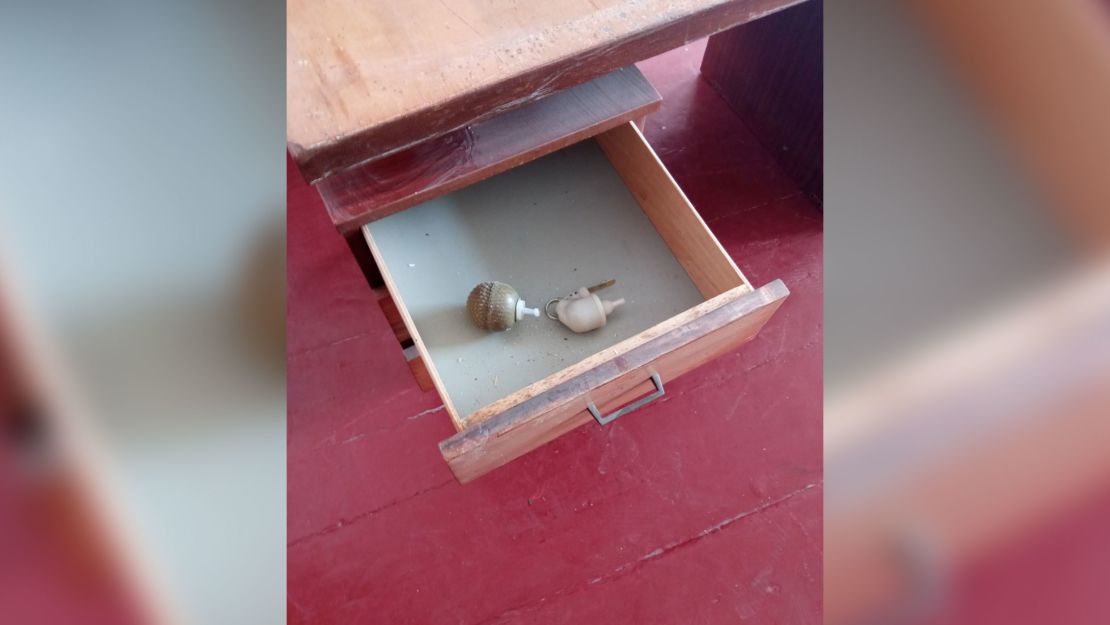
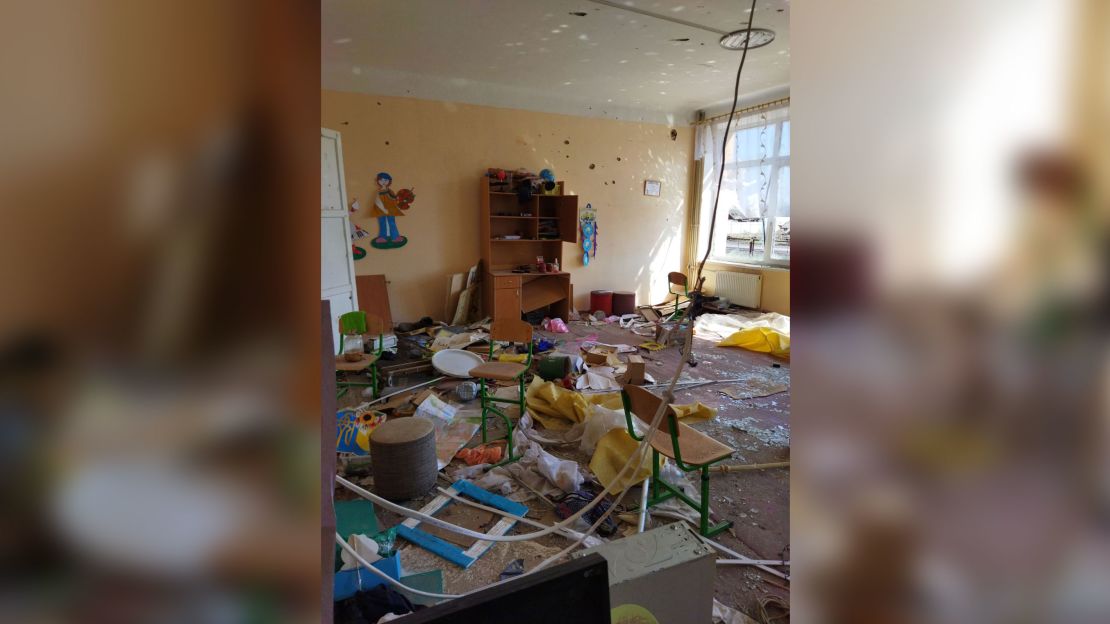
The Novyi Bykiv school building is shaped in a letter U, enclosing the school yard on three sides.
“This was convenient for them, they put a rocket launcher in the center and launched rockets from the center of the school,” Vovk said, adding that the school’s layout and its basements made it easier for the Russian troops to hide from incoming danger.
“There are many passages in the school: You can enter from one side and exit from the other side and they were very comfortable with it. They even had a dining room there,” she added.
Vovk said she believed some of the messages left by the Russian troops showed their personal desperation. Many were expressing anti-war sentiments, she said, and at least five of the notes were calling for friendship.
There was one inscription that said “We all want to LIVE” with the word “live” written in capital letters, she said. Another one said, “We do not understand what we are doing here.”
“I believe these notes show they understood the doom. Perhaps they were waiting for death,” she said. “But they also thought about the fact that they would be punished for the evil they did. It seemed like the [writer] wanted to live, have a baby and do everything as normal, but they understood that after all this they would no longer be able to return to normal life,” she said.
‘Putin is your president’
In the Zdvyzhivka Grammar School in the village of Zdvyzhivka, northwest of Kyiv, another kind of message was found.
“Putin is your president. Children, study diligently, Russia needs educated citizens,” said a note found on a blackboard that was decorated with children’s drawings depicting different planets of the solar system.
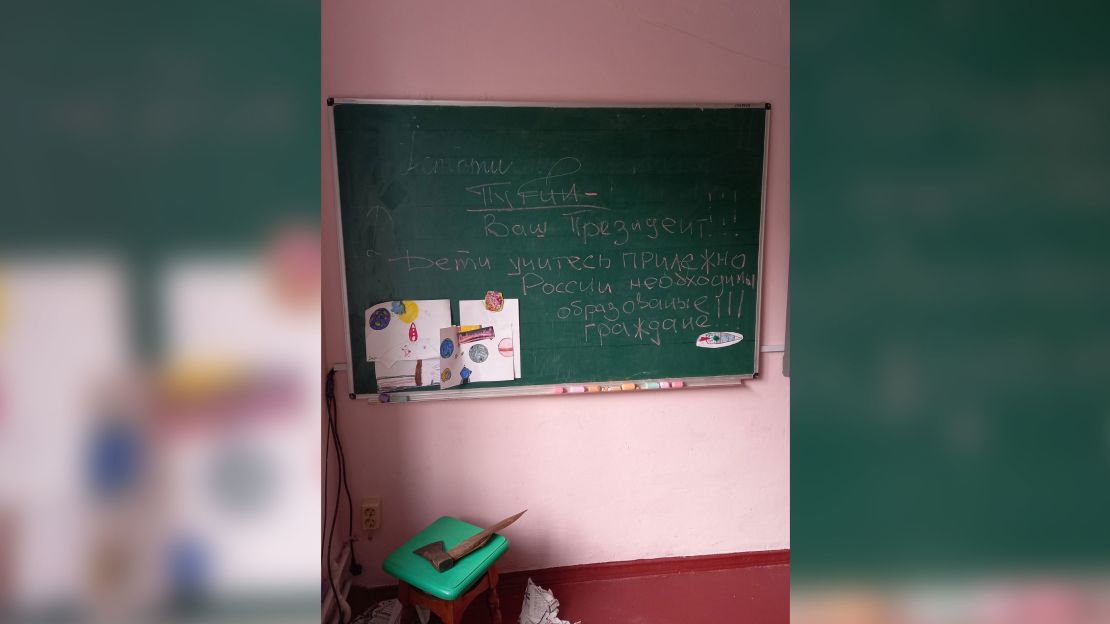
An employee of the school, who wished to remain anonymous because of safety fears, said tripwire mines were found on the school’s premises after the Russians withdrew from the area in late March.
Under Russian control, the Zdvyzhivka school became the headquarters for OMON, the special-police branch of the National Guard of Russia, he said. Like Katyuzhanka, Zdvyzhivka is also located on one of the main roads leading to Kyiv from the north.
As in the two other schools, almost all of the Zdvyzhivka school’s equipment was either stolen or destroyed.
“They smashed the children’s tables, destroyed the kindergarten, the windows are broken. They stole smartboards and laptops,” the employee said.
“We had a large LCD TV. They couldn’t steal it because it was too big. So they shot it and left it in the classroom,” the employee added.
On a blackboard near the smashed-up TV screen, another message was found written on a blackboard: “Forgive us!”


